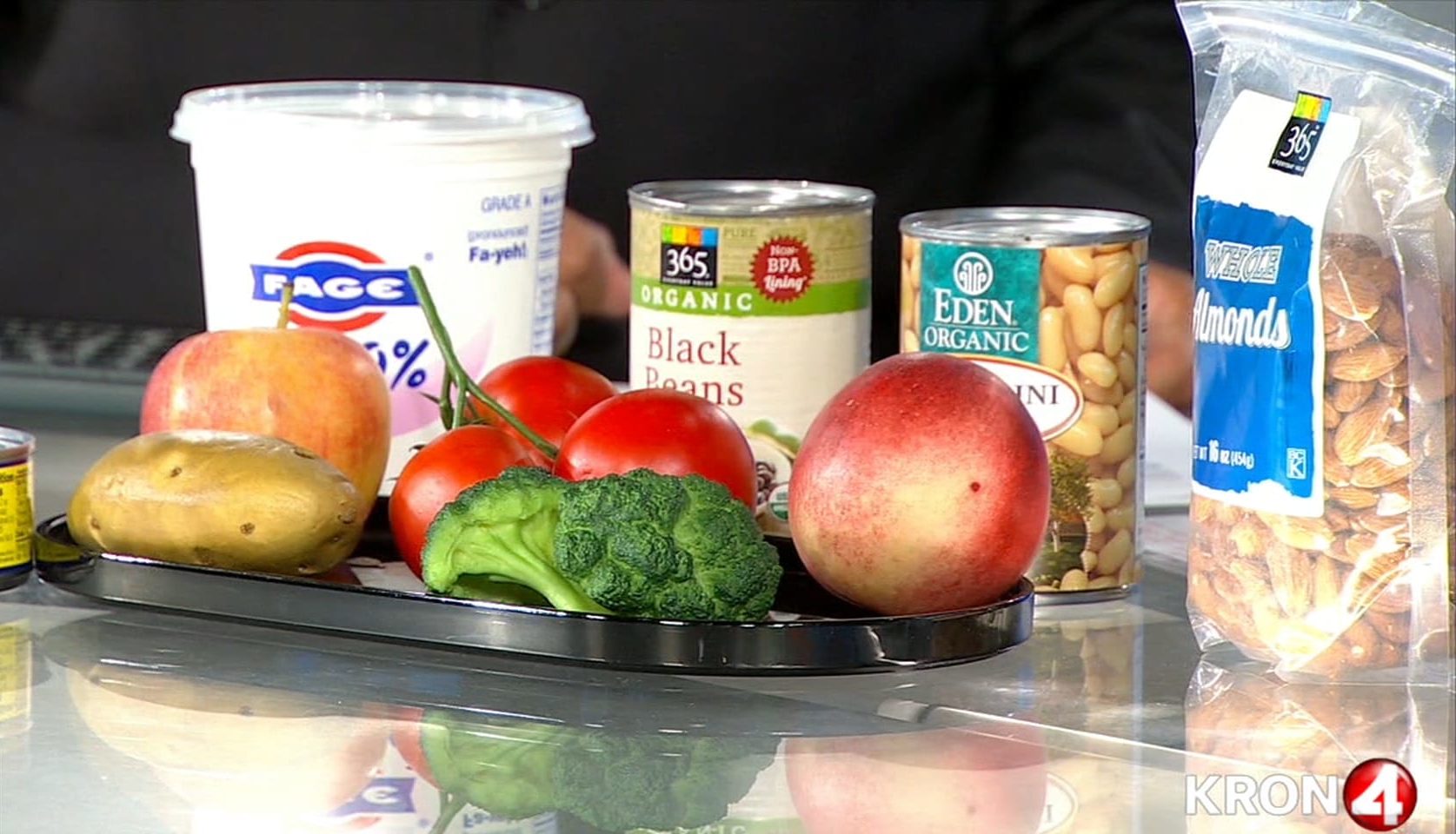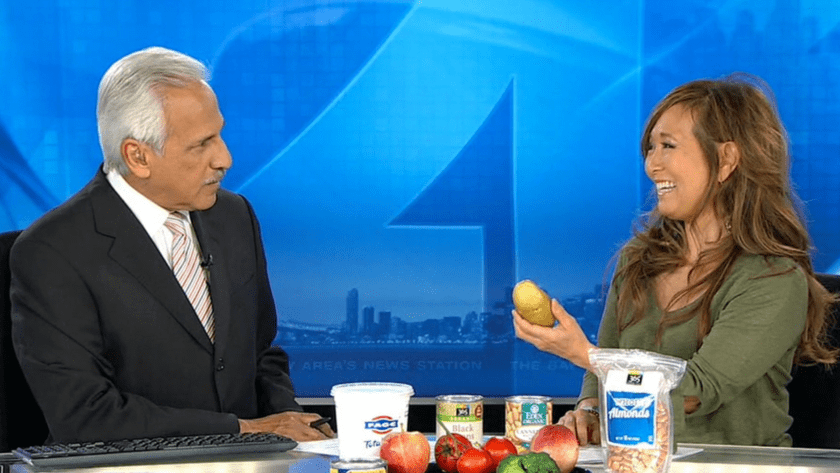Consuming the ideal foods and fluids after your workouts is vital for optimal fitness. But figuring out what you should eat and drink can be confusing. I talked with KRON 4 Morning News anchor, Marty Gonzalez, and deciphered what to eat — and when.
Recovery Nutrition
Recover nutrition has two primary goals:
- To replace what’s lost during exercise, such as fluid and fuel
- To promote muscle building and repair
General Post-Exercise Guidelines
- Consume 1.0 to 1.5 grams carbohydrate (CHO) per kg body weight
- during the first 30 minutes after exercise and again every 2 hours for 4 to 6 hours.
- Consume 15 to 25 grams protein during recovery.
- Drink 16 to 24 oz. of fluid for every pound of weight lost during exercise
The Window of Metabolic Opportunity
After exercise, your body is starved for nutrients and quickest at absorbing them during the first 30 minutes after exercise and at two-hour intervals for 4 to 6 hours.
The earlier you eat carbohydrates within this window, the faster you’ll replenish your glycogen (energy) stores. Once depleted, it generally takes 24 hours to fully replenish these reserves. Waiting too long to eat can impair your performance and function.
Eating Carbs Immediately After Exercise is NOT for Everyone
Carb consumption right after exercise is important if you:
- Work out daily.
- Train or compete multiple times a day.
- Participate in high intensity or prolonged exercise.
- Have defined fitness, muscle mass, and performance goals.
If you’re an occasional exerciser or rest one or more days between intense workouts, nutrient timing isn’t critical, but the nutritional components of recovery are still required.
Be sure your intake of CHO is adequate and consumed within a reasonable time after training.
NOTE: In general, consuming a high CHO snack with some protein during recovery is a good practice for athletes and avid exercisers.
Food Planning
Planning post-exercise and post-competition snacks/meals to fit within the recovery window will take some time at first. You’ll need to figure out what, how much, and when to eat as well as how to make the food available after your workout.
Immediate Post-Exercise Snack
Immediate recovery nutrition has been shown to improve athletic performance.
- Large baked white potato – 65 gm CHO, 7 gm protein (preferably organic)
Potatoes are also high in potassium, vitamin C and B6 — all essential post-exercise micronutrients. Compare it with other nutrient-poor high glycemic carbs, such as:
- Bagel, 4 1/2” – 56 gm CHO, 11 gm protein
- Pretzels, 10 twists – 48 gm CHO, 5 gm protein
- White jasmine rice, 1 cup – 45 gm CHO, 4 gm protein
During recovery, eat carbohydrates that are high on the glycemic index* to replenish depleted glycogen stores. High glycemic foods are CHOs that break down quickly during digestion and release glucose into the blood stream.
Your body has two forms of long-term energy reserves (glycogen and triglyceride).Muscle glycogen is a form of carbohydrate stored in your muscles and liver — your primary source of energy during exercise.
Low glycogen levels = Decreased energy to gain strength and muscle
Glycogen stores are warehoused in your liver and muscles for future use. (Your muscles store 5X more glycogen than the liver.) Glycogen feeds your muscles and your brain. Triglyceride stores are warehoused in adipose tissue (i.e., body fat).
Immediate Post-Exercise Drink
- Chocolate milk, nonfat/lowfat = 27 grams CHO; 9 grams protein* OR
- Milk, nonfat/lowfat (89% water) = 12 grams CHO; 9 grams protein
*In my book, Athletes in Aprons: The Nutrition Playbook to Break 100, I show you how to make a “healthy” chocolate milk.
Studies revealed a greater increase in lean body mass and muscle growth in resistance exercisers who drank milk during recovery compared to those who drank commercial sports drinks.
 Get in the routine of weighing yourself before and after your workouts — especially when environments are hot and humid, cold and/or at high altitudes (over 8200 feet), or you perspire a lot.
Get in the routine of weighing yourself before and after your workouts — especially when environments are hot and humid, cold and/or at high altitudes (over 8200 feet), or you perspire a lot.
Drink at least 16-24 ounces of fluid for every pound of body weight lost during exercise.
To achieve optimal rehydration post-exercise, continue to drink water with subsequent meals and snacks.
Fruits and vegetables make excellent snacks with their high water content. These foods help replace lost fluids while being a valuable carbohydrate and nutrient source.

Post-Exercise Meal
For optimal recovery, plan a meal that includes:
- Lean protein* (15-25 gm) to stimulate muscle protein repair and growth, such as beans, clams, Greek yogurt (More than this amount has shown to have no significant benefit.)
- Carbohydrates to replenish glycogen stores
- Healthy fat (vitamin E) to reduce cell damage, such as almonds
- Unlimited fruits and vegetables for nutrients, hydration, antioxidants, such as cantaloupe, watermelon, salad
![]() Karen’s Fit Tip: Take the time to plan your post-exercise meals and snacks — especially if you’re trying to lose weight. If you deplete your energy stores after exercising, you’ll be inclined to grab the first food available which may not be in your fitness plan.
Karen’s Fit Tip: Take the time to plan your post-exercise meals and snacks — especially if you’re trying to lose weight. If you deplete your energy stores after exercising, you’ll be inclined to grab the first food available which may not be in your fitness plan.

